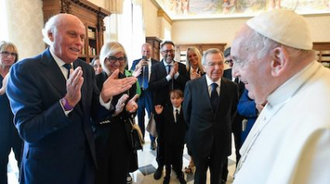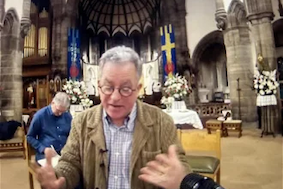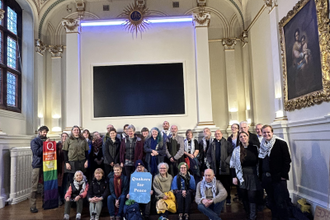Pope asks journalists for help in communicating Synod

Image: Vatican Media
Source: Vatican Press Office
On Saturday, Pope Francis was chosen as the 2023 recipient of the prestigious Italian E' Giornalismo award which is presented to individuals who have shaped the narrative of current affairs in Italy with "objectivity, professionalism and creativity."
In his acceptance speech, Pope Francis said he has always declined this kind of prize, but he had chosen to accept this one in order highlight "the urgency of constructive communication, which fosters the culture of encounter and not of confrontation; the culture of peace and not of war; the culture of openness to the other and not of prejudice."
He then issued a call for help: "At a time when everyone seems to comment on everything, even regardless of the facts and often even before being informed," he said, it is necessary to "cultivate the principle of reality, of facts."
Disinformation, the Pope added, is one of the sins of journalism, of which there are four: "misinformation, when journalism does not inform or informs badly; slander …; defamation, which is different from slander but destroys; and the fourth is coprophilia, that is, the love of scandal, of filth, scandal that sells."
To combat disinformation, he said those who work in communications need to spread a culture of encounter, a culture of dialogue, a culture of listening to the other and his reasons.
He warned against the risks in digital culture, which, he said, has brought us so many new possibilities for exchange, but risks turning communication into slogans.
True communication, he said, is always based on giving the facts of both sides, and he expressed concern for "the manipulations of those who interestingly propagate fake news to steer public opinion."
At a time in which Europe is experiencing the continuation of war in Ukraine, the Holy Father appealed, "Please, let us not give in to the logic of opposition, let us not be influenced by hate language."
"My hope is that space will be given to the voices of peace, to those who strive to put an end to this as to so many other conflicts, to those who do not give in to the 'Cainist' logic of war but continue to believe, despite everything, in the logic of peace, the logic of dialogue, and the logic of diplomacy," he said.
Finally, he looked ahead to the upcoming Synod on Synodality which takes place in October, and appealed to journalists to help the Church "rediscover the word together."
"In just over a month, bishops and lay people from all over the world will meet here in Rome for a Synod on synodality: listening together, discerning together, praying together," he explained, noting that the word 'together' is very important in a culture of exclusion.
Acknowledging that to speak of a "Synod on Synodality" may seem somewhat "abstruse, self-referential, excessively technical, of little interest to the general public," the Pope said that what is happening with the Church's synodal journey is something truly important for the Church.
"Please, let us get used to listening to each other, to talking, not cutting our heads off for a word. To listen, to discuss in a mature way. This is a grace we all need to move forward. And it is something the Church today offers the world, a world so often so incapable of making decisions, even when our very survival is at stake. We are trying to learn a new way of living relationships, listening to one another to hear and follow the voice of the Spirit," he said.
Reiterating that synod participants want to contribute together to building a Church where everyone feels at home, where no one is excluded, Pope Francis reiterated his request "to the masters of journalism" for help to "tell this process for what it really is, leaving behind the logic of slogans and pre-packaged stories.
The full text of Pope Francis' address follows:
Dear friends, welcome!
I greet you and thank you for this meeting and for the awarding of the "È Giornalismo" Prize. You must know that, even before becoming bishop of Rome, I used to decline the offer of awards. I never received any, I did not want to. And I have continued to do so even as Pope. There is, however, one reason that prompted me to accept yours, and that is the urgency of constructive communication, which fosters the culture of encounter and not of confrontation; the culture of peace and not of war; the culture of openness to the other and not of prejudice. You are all distinguished exponents of Italian journalism. Allow me, then, to confide in you a hope and also to frankly address a request for help. But I am not asking you for money, rest assured!
The hope is this: that today, in a time in which everyone seems to comment on everything, even regardless of the facts and often even before being informed, we rediscover and return to cultivating more the principle of reality - reality is superior to the idea, always -: the reality of facts, the dynamism of facts; which are never static and always evolve, towards good or evil, so as not to run the risk of the information society turning into the disinformation society. Disinformation is one of the sins of journalism, of which there are four: disinformation, when journalism does not inform or informs badly; slander (sometimes this is used); defamation, which is different from slander but destroys; and the fourth is coprophilia, that is, the love of scandal, of filth; scandal sells. Disinformation is the first of the sins, the mistakes - let's say - of journalism.
To do this, however, we need to spread a culture of encounter, a culture of dialogue, a culture of listening to the other and his or her reasons. Digital culture has brought us so many new possibilities for exchange, but it also risks turning communication into slogans. No, communication is always back and forth. I speak, I listen, and I respond, but always dialogue. It is not a slogan. I am concerned, for example, about the manipulations of those who interestingly propagate fake news to steer public opinion. Please, let us not give in to the logic of opposition, let us not be influenced by the language of hatred. At the dramatic juncture that Europe is experiencing, with the continuation of the war in Ukraine, we are summoned to a reawakening of responsibility. My hope is that space will be given to the voices of peace, to those who are committed to putting an end to this as to so many other conflicts, to those who do not surrender to the "cainist" logic of war but continue to believe, despite everything, in the logic of peace, the logic of dialogue, the logic of diplomacy.
And now I come to the request for help. Precisely at this time, when there is much talk and little listening, and when the sense of the common good is in danger of weakening, the Church as a whole has embarked on a journey to rediscover the word together. We must rediscover the word together. Walk together. Question together. Take responsibility together for community discernment, which for us is prayer, as the first Apostles did: this is synodality, which we would like to make a daily habit in all its expressions. Precisely for this purpose, in just over a month, bishops and lay people from all over the world will meet here in Rome for a Synod on synodality: listening together, discerning together, praying together. The word together is very important. We are in a culture of exclusion, which is a kind of communication capitalism. Perhaps the usual prayer of this exclusion is: "I thank you, Lord, because I am not like that, I am not like that, I am not...": they exclude themselves. We must thank the Lord for so many good things!
I am well aware that speaking of a "Synod on Synodality" may seem something abstruse, self-referential, excessively technical, of little interest to the general public. But what has happened over the past year, which will continue with the assembly next October and then with the second stage of Synod 2024, is something truly important for the Church. It is a journey that Saint Paul VI began at the end of the Council, when he created the Secretariat of the Synod of Bishops, because he had realised that in the Western Church synodality had disappeared, whereas in the Eastern Church they have this dimension. And this years-long journey - 60 years - is bearing great fruit. Please, let us get used to listening to each other, to talking, not cutting our heads off for a word. To listen, to discuss in a mature way. This is a grace we all need in order to move forward. And it is something the Church today offers the world, a world so often so incapable of making decisions, even when our very survival is at stake. We are trying to learn a new way of living relationships, listening to one another to hear and follow the voice of the Spirit. We have opened our doors, we have offered everyone the opportunity to participate, we have taken into account everyone's needs and suggestions. We want to contribute together to build the Church where everyone feels at home, where no-one is excluded. That word of the Gospel that is so important: everyone. Everyone, everyone: there are no first-, second- or third-class Catholics, no. All together. Everyone. It is the Lord's invitation.
Therefore I dare to ask you, the experts of journalism, for help: help me to narrate this process for what it really is, leaving behind the logic of slogans and pre-packaged stories. No: reality. Someone said: "The only truth is reality". Yes, reality. We will all benefit from this, and I am sure that this too "is journalism", "è giornalismo"!
Dear friends, once again I thank you for this meeting, for what it means with regard to our common commitment to truth and peace. I entrust you all to the intercession of Mary, and please, do not forget to pray for me!
LINK
www.vatican.va/content/francesco/en/speeches/2023/august/documents/20230826-premio-giornalismo.html


















